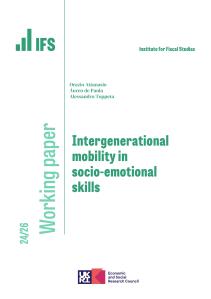This paper examines the family incomecollege enrolment relationship and the evidence on credit constraints in postsecondary schooling. We distinguish short run liquidity constraints from the long term factors that promote cognitive and noncognitive ability. Long run factors crystallised in ability are the major determinants of the family income schooling relationship, although there is some evidence that up to 8% of the total US population is credit constrained in a short run sense. Evidence that IV estimates of the returns to schooling exceed OLS estimates is sometimes claimed to support the existence of substantial credit constraints. This argument is critically examined.
Authors

Pedro Carneiro
Research Fellow University College London
Pedro is a Professor of Economics at University College London and an economist in the IFS' Centre for Microdata Methods and Practice (cemmap).

James Heckman
Research Associate University of Chicago
James is a Research Associate of the IFS and the Henry Schultz Distinguished Service Professor of Economics at the University of Chicago.
Suggested citation
Carneiro, P and Heckman, J. (2002). 'The evidence on credit constraints in post-secondary schooling' (2002)
More from IFS
Understand this issue

What has been happening with university finances?
explainer
IFS Associate Director Christine Farquharson explains.
27 June 2024

Election Special: Is there a 'conspiracy of silence' between both parties?
podcast
In this episode, we discuss the tight fiscal situation after the next budget, and also look at how the education system is faring.
6 June 2024

What is the two-child limit in benefits?
explainer
IFS Associate Director Tom Waters explains.
27 June 2024
Policy analysis

Free breakfast clubs in schools: what Labour’s plans would mean for pupils and families
comment
Labour’s manifesto promises free breakfast clubs in all primary schools. This comment examines possible benefits and challenges with the policy.
25 June 2024

The uncertain course for school and college funding over the next parliament
comment
This piece analyses the 2024 general election manifesto commitments on school and college funding from the main UK political parties.
19 June 2024

Labour’s plans to build childcare spaces in schools will nudge the market in a different direction – but not transform it
comment
The plans announced today may nudge the childcare market in a different direction – but certainly won’t transform it.
9 June 2024
Academic research

Economics of Childhood Nutrition Workshop
workshop
26 June 2024 at 13:00
The IFS and Royal Holloway University of London are co-organising this academic workshop on the economics of childhood nutrition.

Higher Education Access and Funding: challenges and policy options
conference
14 May 2024 at 11:00
This one-day academic conference looked at access to and funding of Higher Education systems.

Intergenerational mobility in socio-emotional skills
working paper
This paper investigates the intergenerational transmission of socio-emotional skills during childhood, using the 1970 British Cohort Study in the UK.
5 June 2024